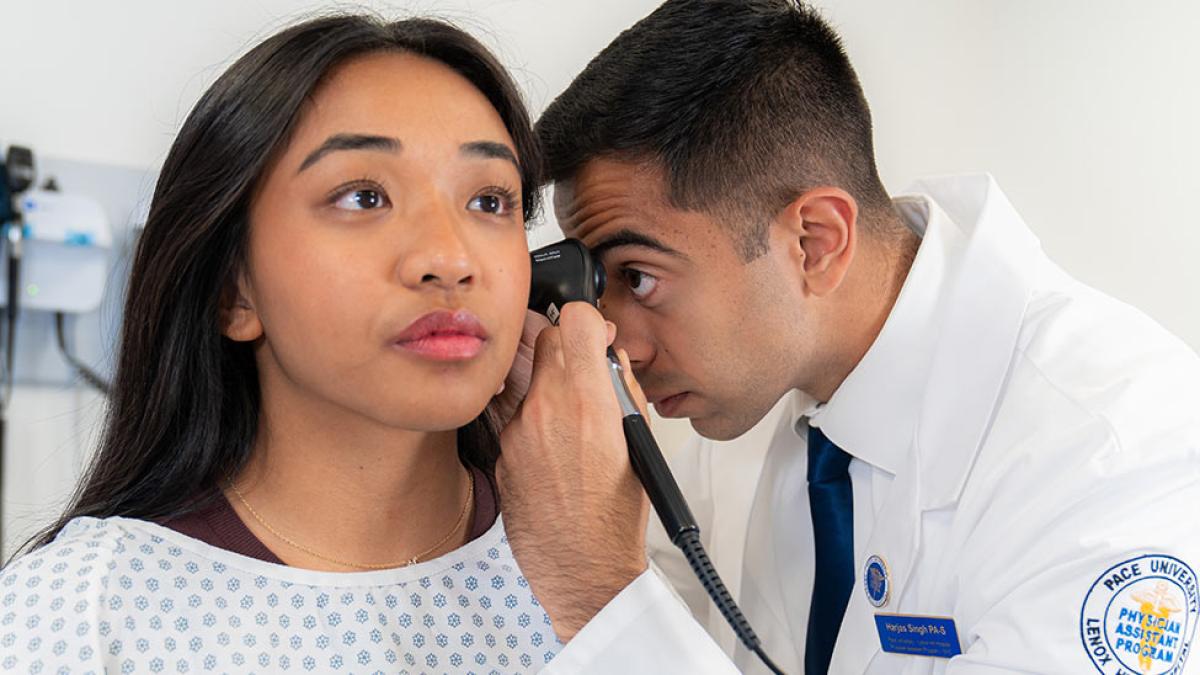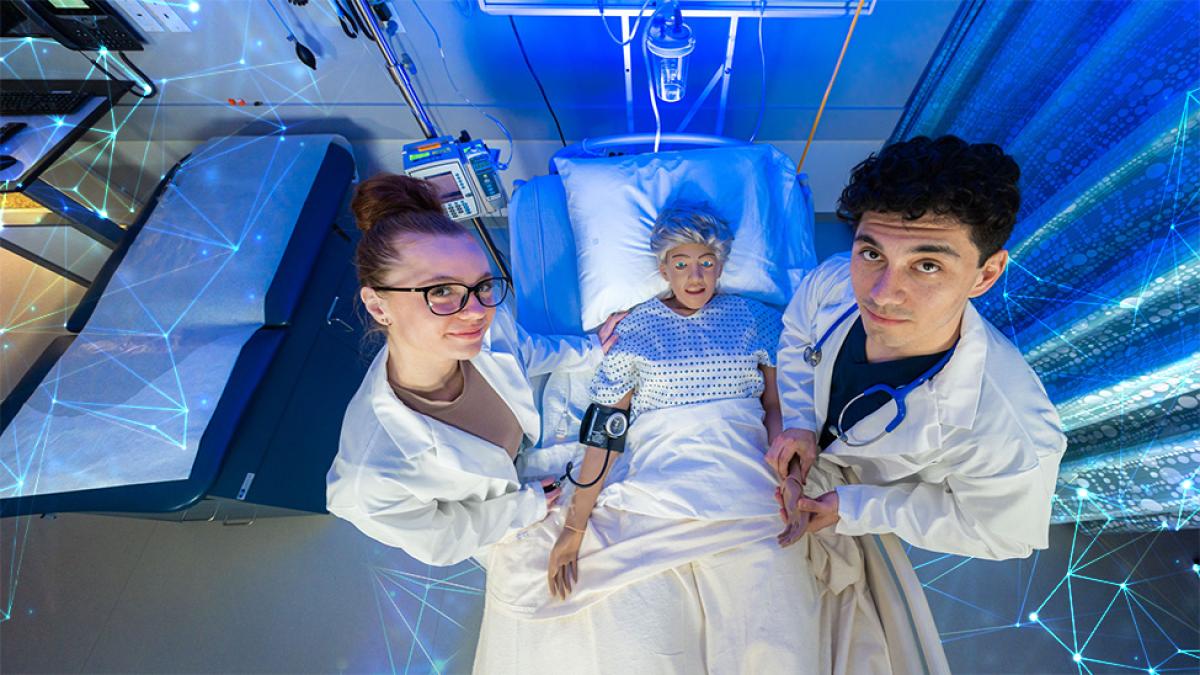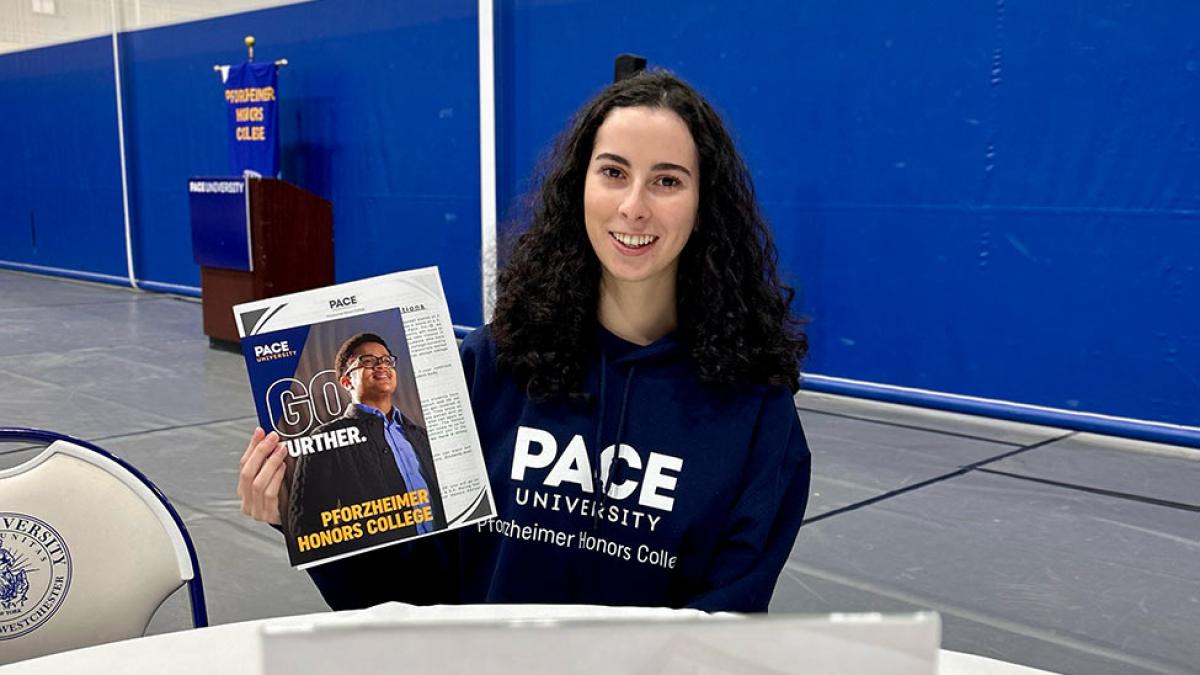Pace University awarded full accreditation in Human Simulation by the Association of Standardized Patient Educators (ASPE).
What Jobs Can You Get with a Health Science Degree?

A Bachelor of Science in Health Science connects you to numerous in-demand careers, including physician assistant, nurse, health advocate, and so many others. The healthcare field is growing, providing a variety of opportunities for students to pursue fulfilling career paths that make a difference in people’s lives.
Healthcare remains one of the fastest-growing industries contributing new jobs to the economy. According to the U.S. Bureau of Labor Statistics, employment in healthcare occupations is projected to grow much faster than average from 2023 to 2033, with about 1.9 million openings projected each year due to growth and worker replacement needs.
Majoring in health science is a good option for students interested in healthcare but are unsure of the exact path they wish to take after completing their bachelor’s degree. A health science degree can guide your career exploration and even offer the opportunity for first-hand healthcare experience through fieldwork and other applied practice options. After majoring in health science, students can pursue graduate education to prepare for a specific clinical role or jump right into an entry-level position in healthcare.
What is a Health Science Major?
By majoring in health science, you often take courses in the natural sciences and social sciences alongside courses providing foundational knowledge on healthcare systems. Compared to other common pre-health majors, studying health science provides a well-rounded mix of prerequisite courses that prepare students for graduate-level training or for entry-level roles in the healthcare field.
Health science is both a specific undergraduate degree—e.g., the Bachelor of Science in Health Science at Pace University—and a broader academic field. The term also refers to related disciplines such as public health, nutrition and dietetics, health informatics, occupational therapy, communication sciences and disorders, and mental health counseling. This wide scope makes health science an ideal foundation for students considering a variety of graduate programs and career paths in healthcare.
“An undergraduate degree in health science prepares students for successful careers in the healthcare field,” says Denise Tahara, PhD, chair of the Health Science Department at Pace University. “The foundational courses cover subjects in the natural and social sciences, policy, advocacy, and managing the health of diverse populations. Students have the opportunity to complete applied practice fieldwork in a variety of healthcare systems, conduct research, and train for next steps in clinical education or healthcare management.”
Additionally, health science programs provide connections to internships, extracurriculars, and potential opportunities to conduct research projects, incorporating career exploration and student leadership directly into your undergraduate experience. Majoring in health science can also provide unique access to simulation laboratories that add value to your health science coursework and expand your mindset as a future healthcare professional.
What Can You Do with a Health Science Degree?
A Bachelor of Science in Health Science is a flexible, foundational degree that can lead you in two main directions:
- A non-clinical role right after graduation, or
- Continued education to pursue a licensed clinical profession.
Non-clinical careers are available to students who want to enter the healthcare field immediately after earning their bachelor’s degree. These roles focus on healthcare coordination, data analysis, patient advocacy, or administrative support, all critical to the success of any healthcare system.
Clinical careers typically require further education, licensure, or certification. While a BS in Health Science does not qualify students for clinical licensure by itself, many students use this degree to prepare for physician assistant studies, occupational therapy, nutrition and dietetics, public health, health informatics, communication sciences and disorders, nursing, or mental health counseling, to name a few. At Pace, students can continue their education through various related master’s degree programs.
Careers Related to Health Science
A health science major offers career-ready coursework that prepares students for the healthcare field. Graduates pursue a wide range of roles, both clinical and non-clinical, depending on their interests and further education.
Roles that require graduate-level education or licensure:
| Job Title | Responsibilities | Annual New York City Metro Salary (USD) |
|---|---|---|
| Physician Assistant (PA) | Provides diagnostic, therapeutic, and preventive healthcare services under a physician’s supervision | $144,994 |
| Occupational Therapist | Helps patients regain or develop daily living and work skills after illness or injury | $118,484 |
| Registered Dietitian / Nutritionist | Uses evidence-based practices to develop nutrition plans and support patient health | $74,690 |
| Mental Health Counselor | Supports individuals managing mental health challenges through therapy and treatment planning | $90,056 |
| Public Health Specialist | Works to promote community health through education, research, and health policy | $184,495 |
| Speech Language Pathologist | Works to assess, diagnose, and treat communication and swallowing disorders in individuals of all ages | $126,330 |
Non-clinical roles accessible with a BS in Health Science:
| Job Title | Responsibilities | Annual New York City Metro Salary (USD) |
|---|---|---|
| Health Program Coordinator | Plans and manages community health programs and services | $110,281 |
| Medical Office Manager | Oversees operations in healthcare facilities, ensuring efficiency and regulatory compliance | $102,033 |
| Health Data Analyst | Interprets data to improve patient outcomes and operational efficiency | $115,799 |
| Patient Advocate | Supports patients in navigating healthcare systems, treatment plans, and insurance coverage | $55,217 |
| Health Informatics Specialist | Uses technology to manage and improve healthcare data systems and patient health outcomes | $82,490 |
These roles reflect the growing demand across healthcare sectors and the versatility of a health science degree in meeting those needs.
Organizations Hiring Health Science Graduates
With a Bachelor of Science in Health Science, graduates are prepared for roles in hospitals, research institutions, nonprofit organizations, public health agencies, pharmaceutical companies, and private healthcare companies. In the New York metro area, a national hub for healthcare innovation and delivery, employers are especially diverse.
Types of organizations that hire health science graduates include:
- Major hospital systems and healthcare networks, such as NewYork-Presbyterian, Northwell Health, NYU Langone Health, Memorial Sloan Kettering, and Westchester Medical Center, regularly recruit for roles in care coordination, patient advocacy, and healthcare administration.
- Government agencies and public health organizations, including the NYC Department of Health and Mental Hygiene and the New York State Department of Health, offer opportunities in program management, policy analysis, and community health.
- Insurance and healthcare consulting firms, such as EmblemHealth, Oscar Health, and Deloitte, where graduates work as data analysts, project coordinators, or healthcare consultants.
- Nonprofit organizations and health advocacy groups, such as the American Heart Association and Planned Parenthood of Greater New York, employ graduates in education, outreach, and research roles.
- Technology and informatics companies, including health tech startups and large firms like Flatiron Health and Mount Sinai Innovation Partners, seek graduates for roles in health informatics, clinical trials, and data analytics.
Employers in the region value the interdisciplinary training and hands-on experience built into Pace’s BS in Health Science, which prepares students to meet evolving workforce needs.
Majoring in Health Science at Pace University
At Pace University, the Bachelor of Science in Health Science supports a flexible academic path aligned with your healthcare goals. Students choose between two tracks:
- Interdisciplinary Health Science, which includes optional concentrations in Global Health and Policy and Advocacy
- Pre-Health Professions, which prepares students for graduate study in clinical fields and may include these concentrations depending on their path
Beginning in Fall 2025, Pace will offer accelerated dual-degree programs that allow students to complete both a bachelor’s and a master’s degree in just five years. Options include the Master of Public Health, MS in Health Informatics, MS in Nutrition and Dietetics, and MS in Occupational Therapy.
This structured yet flexible curriculum supports students who want to fast-track their education and move confidently into graduate-level study.
Health Science Career Preparation
At Pace, pursuing a health science major connects you to exciting opportunities on campus and throughout the New York metropolitan area. All Health Science students complete applied practice fieldwork experience in their senior year that links them to their future career interests.
On Pace’s Pleasantville Campus, students majoring in Health Science benefit from the health science hub, which includes a state-of-the-art simulation lab and renovated academic spaces designed for immersive learning and professional skill development.
Pace’s location in the New York metro area also offers exceptional access to healthcare organizations and facilities, providing students with valuable applied practice fieldwork experiences that can lead to graduate school acceptance or full-time roles after graduation.
Frequently Asked Questions
Is health science a good degree?
Yes. A health science degree offers strong job prospects and flexibility, especially in a growing healthcare industry that values both clinical and administrative skill sets.
Is a BS in health science worth it?
For students interested in healthcare but not yet set on a specific role, a BS in Health Science provides valuable exposure, practical experience, and the prerequisites needed for many graduate programs. Pace University offers pre-health advising.
What is the highest paying job in health science?
Many of the highest paying roles—such as physician assistant or healthcare administrator—require graduate education. In the NY metro area, physician assistants earn a median salary of around $144,000.
Can health science lead to becoming a doctor?
Yes. A BS in Health Science can be part of the academic path toward medical school, though additional coursework may be needed to meet all prerequisites.
Is health science in high demand?
Very much so. The U.S. Bureau of Labor Statistics projects about 1.9 million healthcare job openings each year from 2023 to 2033, reflecting strong demand across the industry.
Learn More About What You Can Do With a Health Science Degree
Request information today or visit our Pre-Health Advising website to learn more!
More from Pace
With artificial intelligence remodeling how healthcare is researched, and delivered, Pace experts are shaping the technology—and erecting the guardrails—driving the revolution.
Michelle Novominski, now in her final semester of the RN-4 BS in Nursing program at Pace University, has made her mark through leadership roles in both the National Student Nurses Association and the Sigma Theta Tau International Honor Society of Nursing. We caught up with Michelle to hear about her journey, her love for nursing, and the impact of getting involved on campus.


